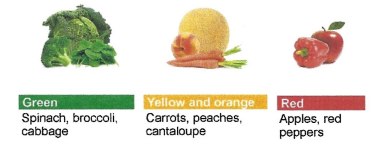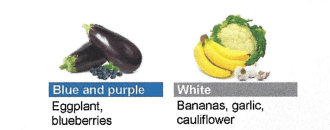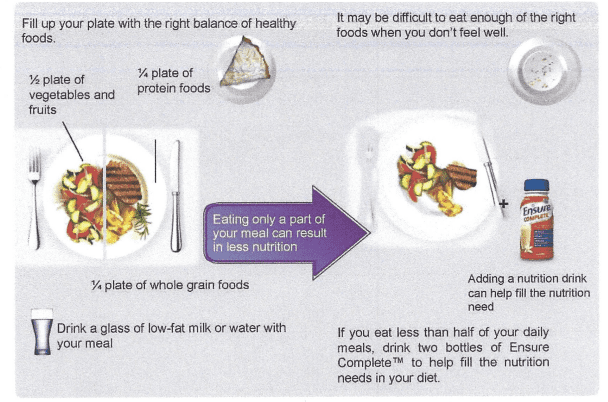Nutrition for Wound Healing
If you have any type of new or chronic wound, good nutrition can help your body's overall health to help support healing. Nutrients from foods help your body build and repair tissue and heal wounds. Good nutrition can also help you fight infection. During healing, your body may need more calories and protein. And if you have diabetes, it's very important to control your blood sugar to help your wound heal.
Nutrients You Need
Nutrition helps give your body the energy it needs to repair tissues and heal wounds. Nutrients you need from food to keep you healthy include:
- Protein. Protein can help build tissue and prevent infections. It's found in meats, fish, eggs, cheese, milk, nuts, and beans.
- Carbohydrates. These help give your body the energy it needs to heal. Carbohydrates are found in grains, fruits, beans, and other legumes.
- Fats. Healthy fats help your organs, skin, hair, and brain. They also help your body absorb certain vitamins.
- Vitamins. These include vitamins C, D, B-6, B-12, folate, and others. These help your body repair tissues, use energy, and do many other processes.
- Minerals. These include iron, magnesium, calcium, zinc, and others. These help with many things, such as making sure your cells have enough oxygen, your nervous system works well, and your bones stay strong.
Preparing Healthy Meals
When making meals each day, follow the guidelines from MyPlate. Your basic daily diet should include:
- Fruits and vegetables. Fruits may be fresh, canned, frozen, or dried, and may be whole, cut-up, or pureed. Vegetables may be fresh, frozen, canned, or dried. Make half your plate fruits and vegetables.
- Grains. All foods made from grains are part of the grains group. These include wheat, rice, oats, cornmeal, and barley. You can find grains in foods such as bread, pasta, oatmeal, cereal, tortillas, and grits. Grains should be no more than a quarter of your plate. Aim to make whole grains at least half or your daily grain intake.
- Protein. This group includes meat, poultry, seafood, beans and peas, eggs, processed soy products such as tofu, nuts including nut butters, and seeds.
- Dairy. All fluid milk products and foods made from milk that contain calcium such as yogurt and cheese are part of the dairy group.
- Oils. These are fats that are liquid at room temperature. Oils are not a food group, but they provide important nutrients your body needs. They include canola, corn, olive, soybean, and sunflower oil. Some foods are naturally high in healthy oils, such as nuts, avocados, olives, and some fish. Foods that are mainly oil include mayonnaise, certain salad dressings, and soft (tub) margarines.
Getting Enough Protein
Protein helps your body build and repair tissues. Protein also helps your immune system work well. This helps protect wounds from infection and let them heal. Infection can delay healing. To get enough protein while you're healing, you can:
- Add protein to every meal. This includes turkey, chicken, beef, pork, lamb, fish, shellfish, eggs, and cheese. Protein is also found in foods such as nuts, nut butters, beans and other legumes, seeds, and tofu. You can also get protein from animal milk and soy milk.
- Have protein supplements between meals. There are many kinds of protein drinks and other protein supplements. These have protein from whey, soy, and other sources. If you have trouble digesting lactose or soy, ask your healthcare provider which type of protein supplement may be best for you.
Adding vitamin C
Research has shown that vitamin C can help with tissue health and repair. Add vitamin C to your diet while your wound is healing. You can get vitamin C in your diet by eating or drinking juice from citrus fruits such as oranges, clementines, grapefruits, lemons, and limes. Other food sources of vitamin C include tomatoes, potatoes, strawberries, green and red bell peppers, broccoli, Brussels sprouts and kiwifruit. You can also get vitamin C in supplement form via tablets, chewables, and other types of supplements.
Adding Zinc
Zinc helps your body's immune system and helps make protein to heal wounds. To add zinc to your diet, choose whole grains and eat protein, such as eggs, meat, dairy or seafood. Zinc is better absorbed from animal sources such as beef and seafood. Good vegetarian sources include wheat germ, beans, nuts, and tofu.
Controlling Your Blood Sugar
If you have diabetes and you have wounds, it's important to control your blood sugar. High blood sugar can slow wound healing and make it easier for wounds to get infected. Take good care to manage your diet, take your diabetes medicine, and measure your blood sugar as directed. Tell your healthcare provider if your blood sugar is not under control. He or she can help you get it back on track.
Helping Wounds Heal
What You Should Eat
1. Choose foods high in protein

2. Include nutrition drinks with added arginine (arginine is essential during times of stress)

3. Add foods high in vitamins and minerals, especially vitamin C and zinc Choose fruits and vegetables in a rainbow of colors to provide essential vitamins and minerals that your body needs. Some examples are:


4. Drink 6 to 8 cups of water or other fluids every day

Why Your Body Needs These Foods:
- Protein builds new skin and muscle
- Arginine supports blood flow and is a building block for proteins, which can contribute to healing
- Foods high in vitamins and minerals, particularly vitamin C, help reduce your risk of infection and promote healing
- Drinking adequate fluids maintains hydration to support your circulation
- Maintaining muscle and organ tissue is vital for normal healing, and proper nutrition plays an important role. If muscles don't receive proper nutrition, your body may use them for energy.
Easy Tips to Get the Nutrients You Need:

1. Snack on foods high in protein, vitamins and minerals such as:
- Smoothies made with yogurt and berries
- Whole wheat crackers topped with peanut butter
- Nutrition drinks like Ensure CompleteTM
- The protein content of 8 fl. oz. of Ensure CompleteTM is equal to 2 small eggs and 2 slices of toast or one small chicken breast and a baked potato
2. If you have diabetes:
- Keep your blood sugar in a normal range (high numbers keep wounds from healing)
- Try Glucerna® bars and shakes for easy snacks
3. If you have trouble eating enough calories:
- Freeze small portions that can be heated easily
- Try eating 4 to 6 small snack-like meals
- Add nutrition drinks like Ensure CompleteTM
4. Talk to your doctor or nurse if:
- You're losing weight
- Your wound is not healing
- The wound becomes red and painful or begins to smell "bad"
- You notice more drainage from the wound
